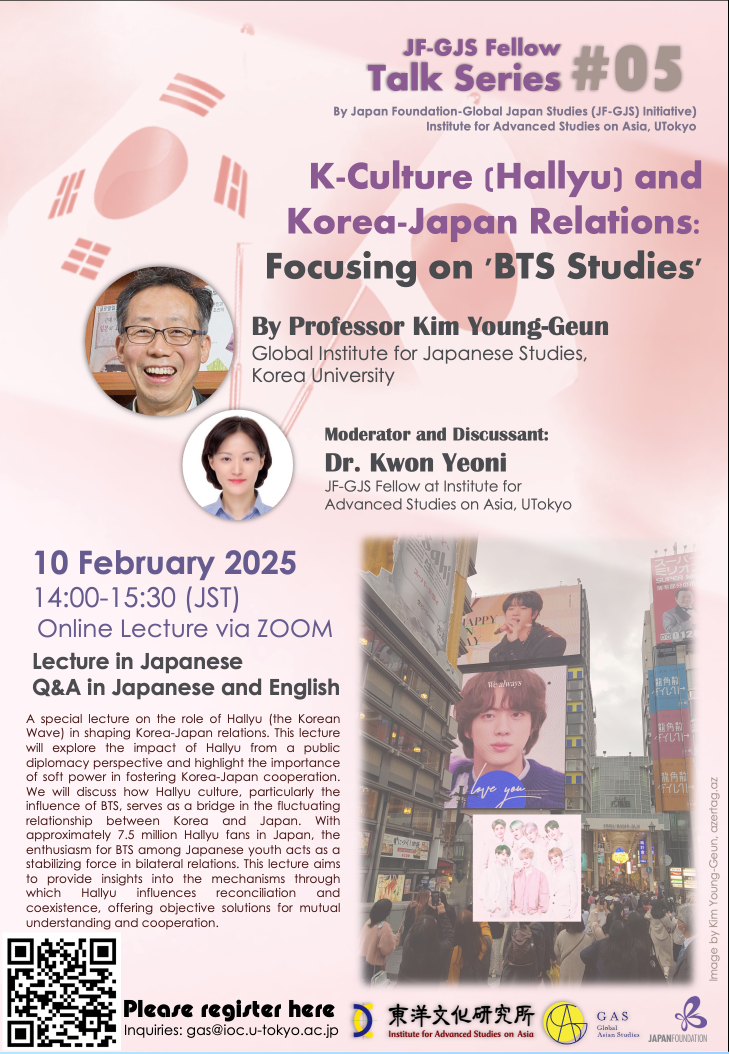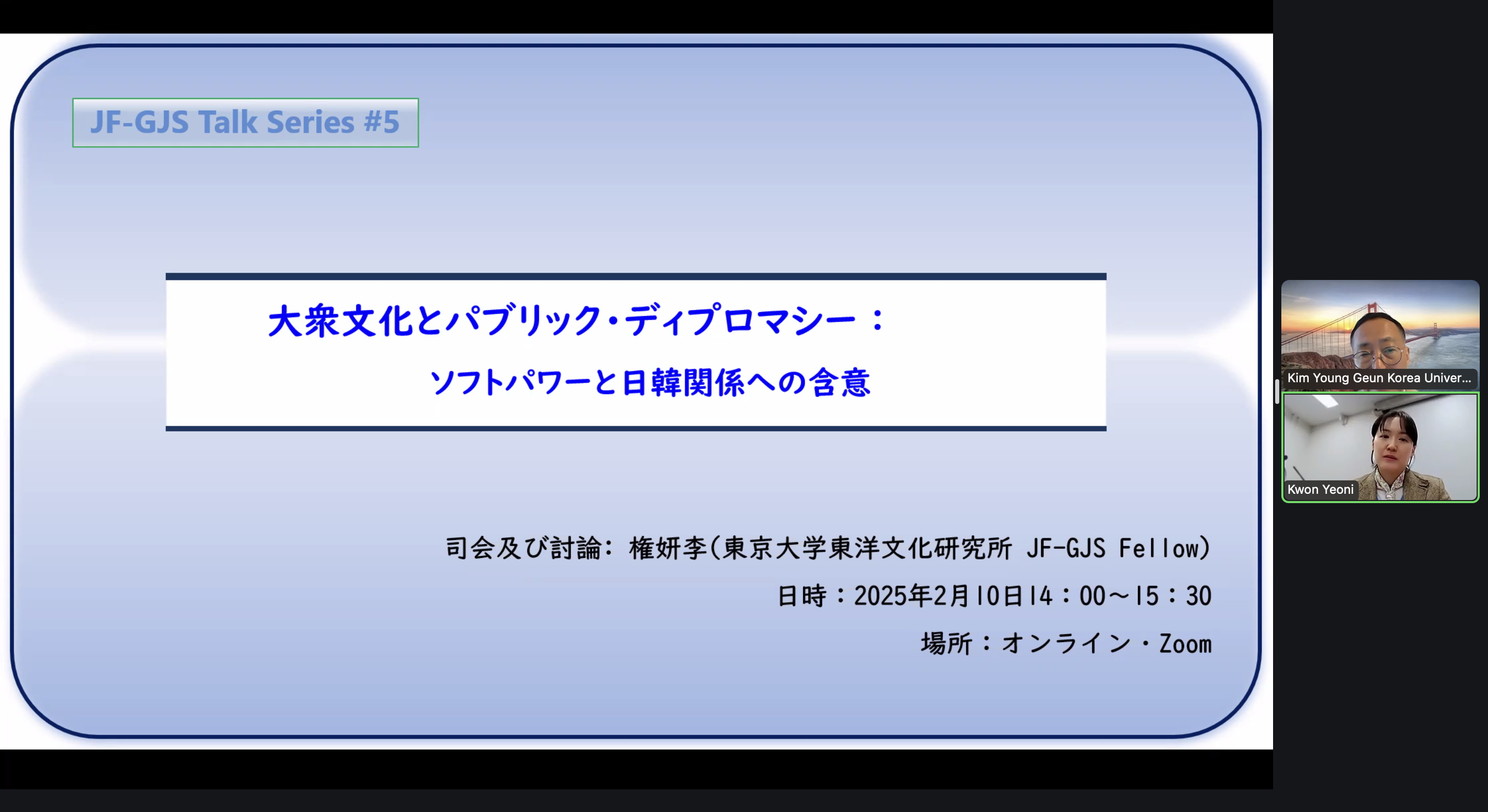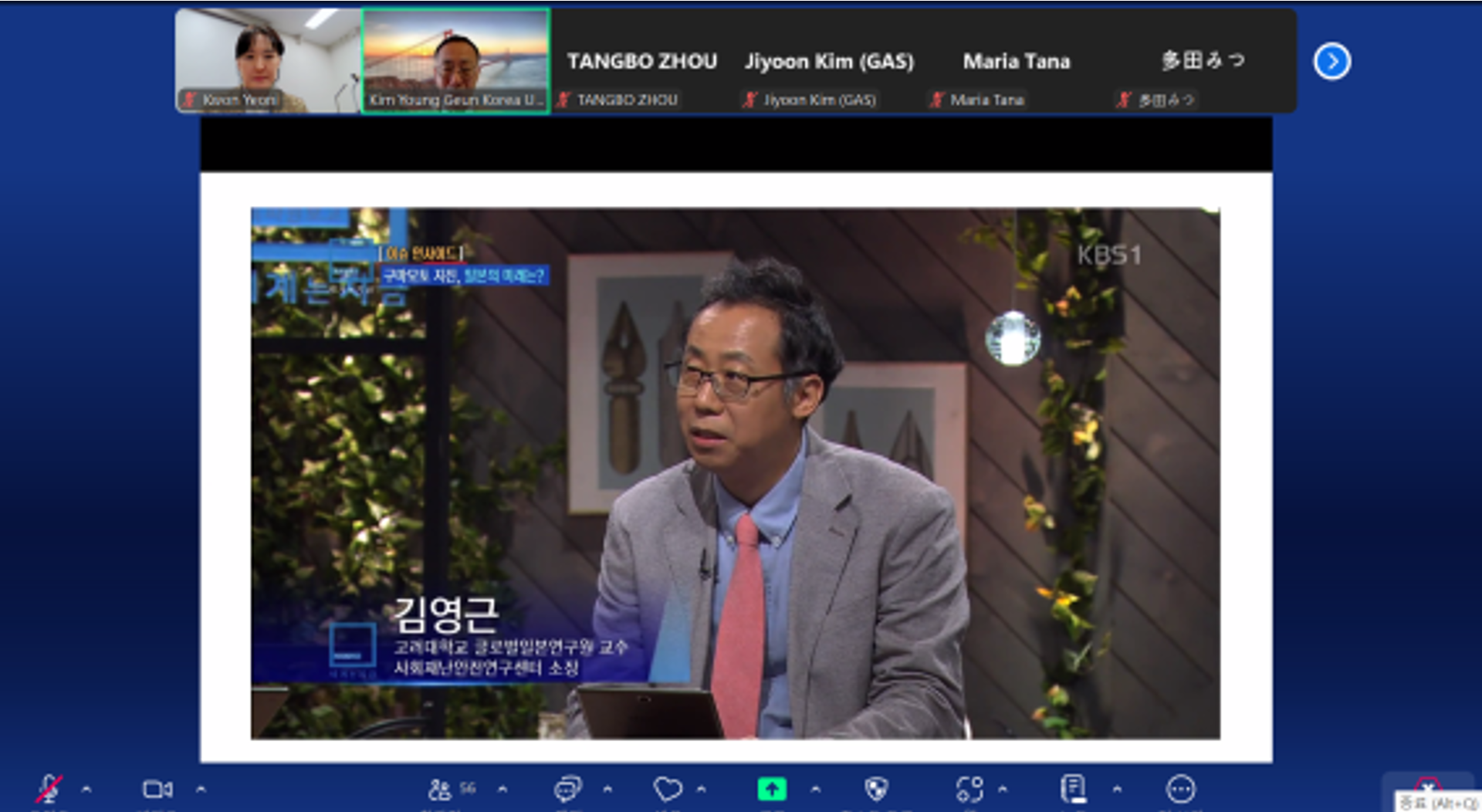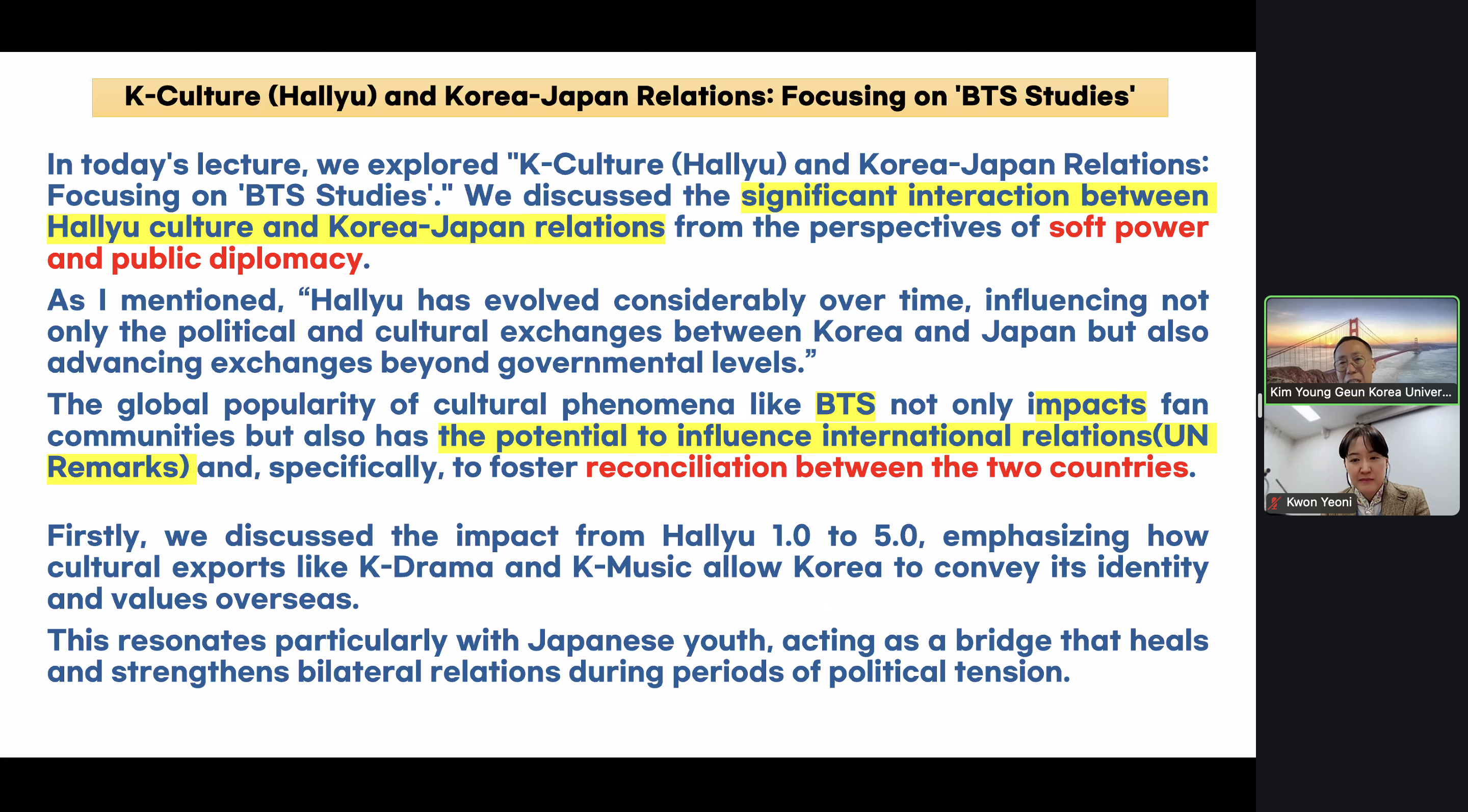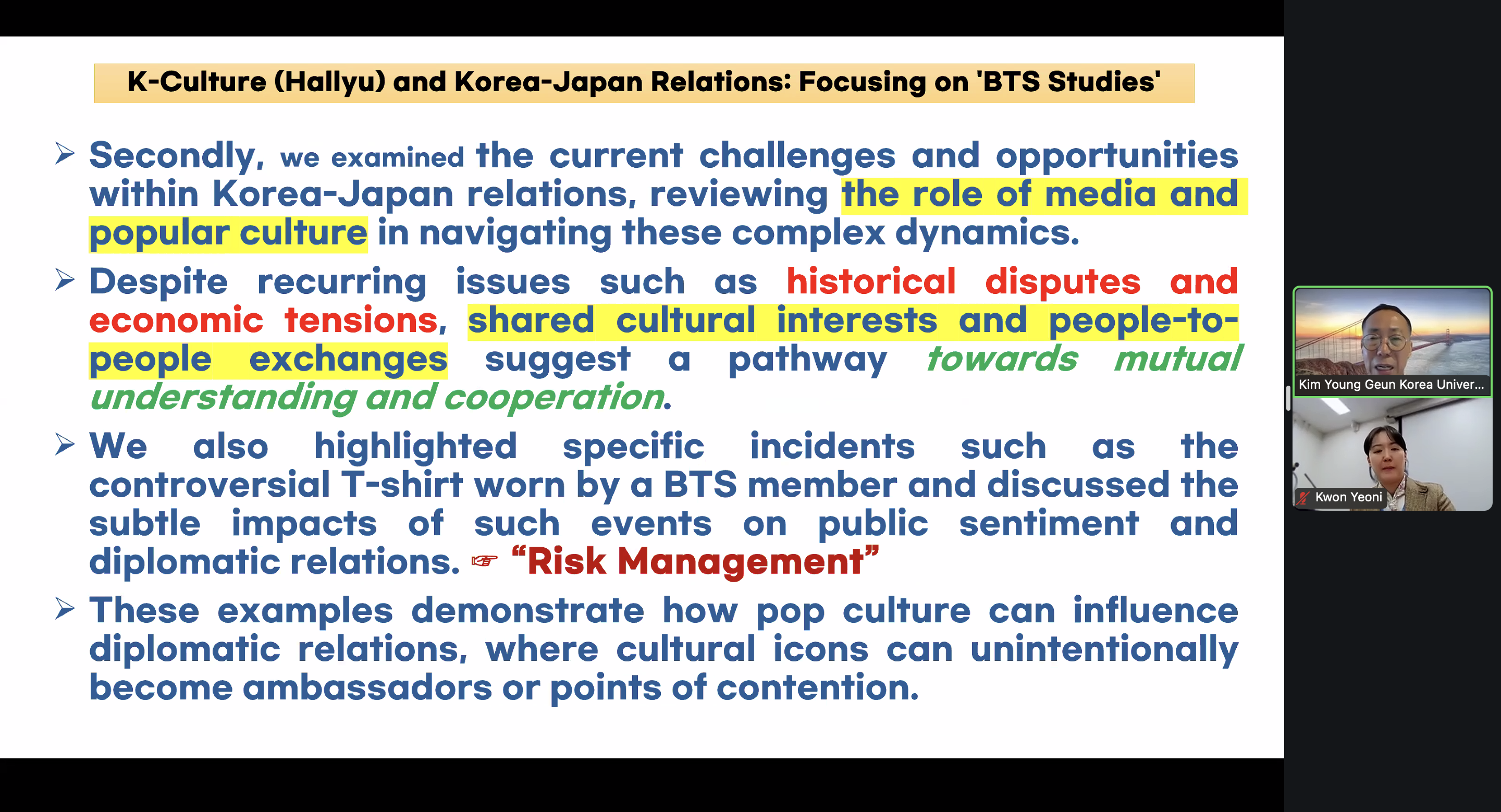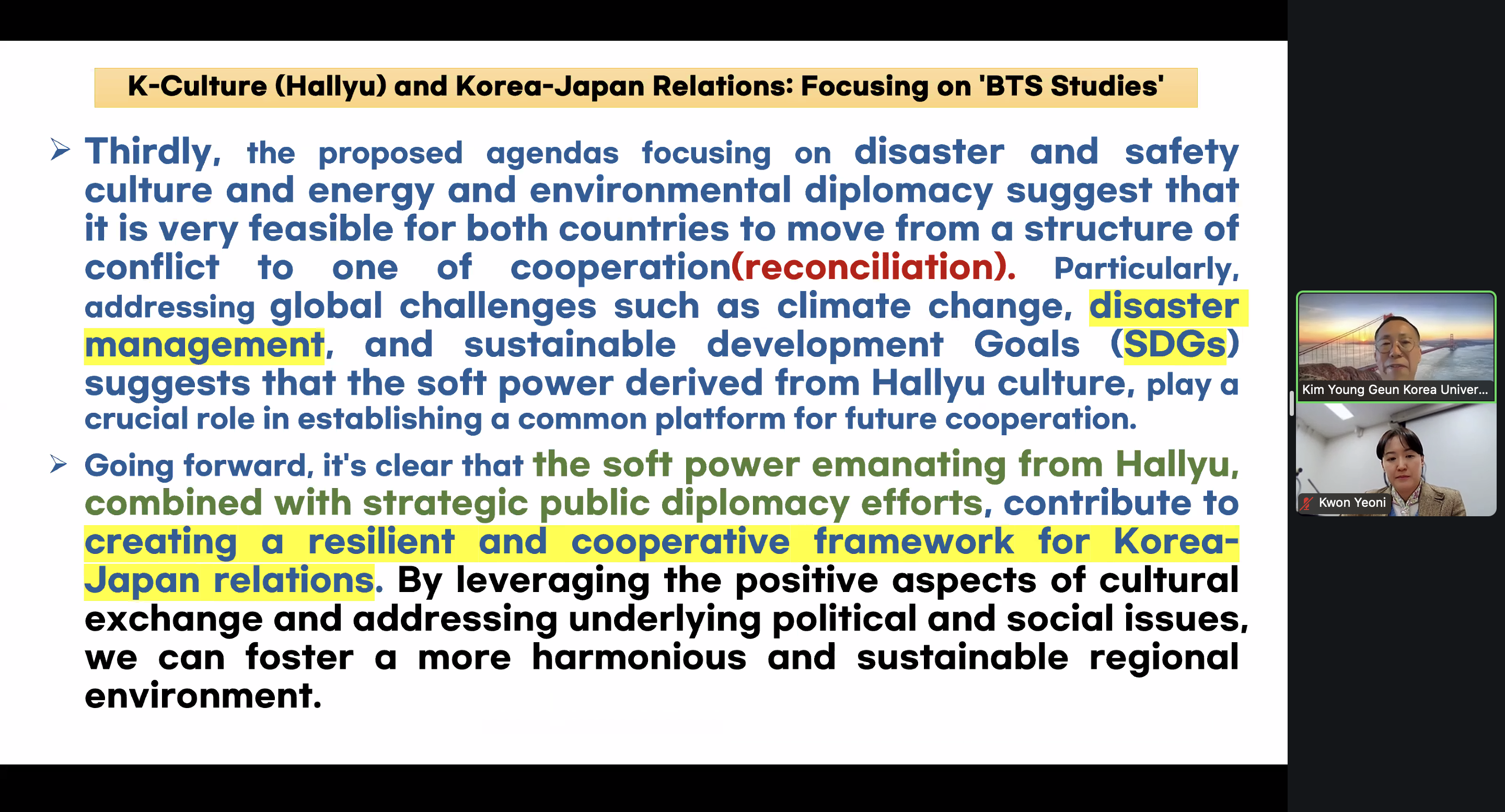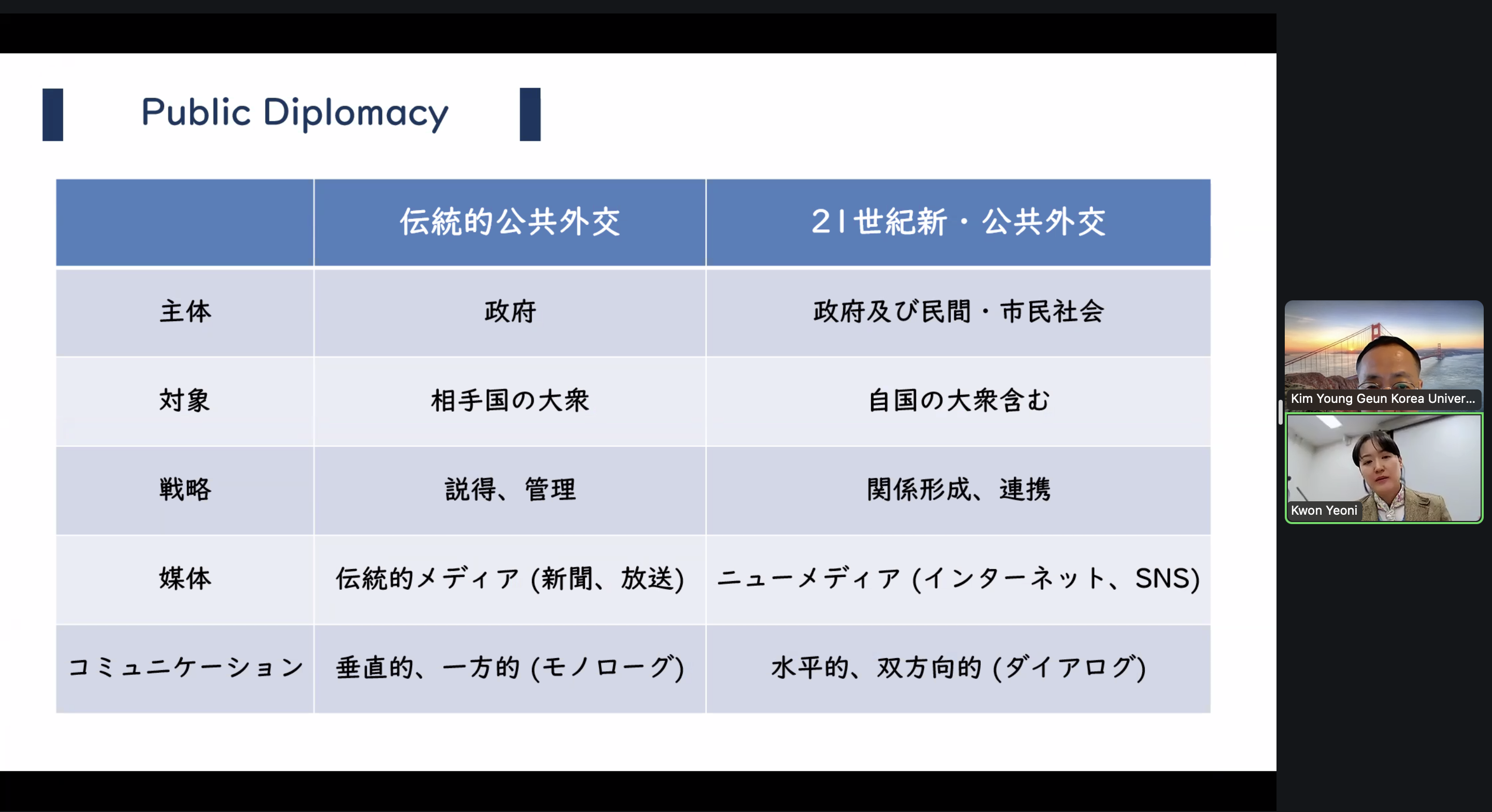- JF-GJS Initiative
JF-GJS Fellow Talk Series 5
K-Culture (Hallyu) and Korea-Japan Relations: Focusing on ‘BTS Studies’
- Finished
- Report
| Date and Time | February 10 (Mon), 2025, 14:00-15:30 (Japan Standard Time) |
|---|---|
| Venue | Online via Zoom |
| Title | K-Culture (Hallyu) and Korea-Japan Relations: Focusing on 'BTS Studies' |
| Speaker | Young-Geun, Kim (Korea University) Dr. Young-Geun, Kim is a professor at the Global Institute for Japanese Studies, Korea University; Director of Center for Social Disaster and Security, Professor Kim received his Ph. D. from University of Tokyo at international Relations Department. He has held various positions, including Research Fellow at the Yale Center for International and Area Studies (YCIAS) in the United States, Research Fellow at the School of International Politics, Economics and Communication at Aoyama-Gakuin University, Research Committee Member at the Center for Northeast Asian Studies at the Institute of Contemporary Economics, Specially Appointed Professor at the Graduate School of Arts and Sciences at University of Tokyo (June-August 2022), and Visiting Researcher at Gakushuin University (September 2022-March 2023). His research interests are US and Reciprocity in South Korean Security Policy, Japanese foreign policy and the world trade system after the disaster, for example, the Great East Japan Earthquake 3.11. He has authored or coauthored more than thirty articles and monographs in various journals, including International Relations and the Korea Journal of Japanese Studies. Dr. Kim’s representative research papers and publications are as bellows; A History of Japan-Korea Relations, 1965-2015 Vol. II ECONOMICS (2015); “The Political Economy of Abenomics, Japan"(2014);“A Transformation of Japanese Economic Policy after Disasters: Comparative Analysis among the Great Kanto, Hanshin-Awaji, the Great East Japan Earthquake and the Post-World War Ⅱ"(2013); “Reciprocity in South Korean Security Policy vis-à-vis North Korea and the United States”(2013) etc. |
| Discussant | Dr. Kwon, Yeoni, JF-GJS Fellow at Institute for Advanced Studies on Asia, University of Tokyo |
| Chair | Dr. Kwon, Yeoni, JF-GJS Fellow at Institute for Advanced Studies on Asia, University of Tokyo |
| Language | Lecture in Japanese, Q&A in Japanese and English |
This event is held online. Please register to the form below for Zoom link: https://u-tokyo-ac-jp.zoom.us/meeting/register/tZIqdeisqTspG9a6AY0vWefmalkNWmlobeHb
Young-Geun, Kim will give a special lecture on the role of Hallyu (the Korean Wave) in shaping Korea-Japan relations. This lecture will explore the impact of Hallyu from a public diplomacy perspective and highlight the importance of soft power in fostering Korea-Japan cooperation. We will discuss how Hallyu culture, particularly the influence of BTS, serves as a bridge in the fluctuating relationship between Korea and Japan. With approximately 7.5 million Hallyu fans in Japan, the enthusiasm for BTS among Japanese youth acts as a stabilizing force in bilateral relations. This lecture aims to provide insights into the mechanisms through which Hallyu influences reconciliation and coexistence, offering objective solutions for mutual understanding and cooperation.
Event Report
Professor Kim Young-geun examined the historical trajectory of the Korean Wave in Japan, including K-culture, and analyzed its role and influence from a risk management perspective. He specifically assessed the Korean Wave as a form of soft power within public diplomacy, where civil society interactions unfold in a complex manner, distinct from traditional diplomacy. Since the normalization of diplomatic relations in 1965, Korea and Japan have maintained a relationship marked by underlying conflicts. However, following the 1998 Korea-Japan Joint Partnership Declaration by Kim Dae-Jung and Obuchi, cultural exchanges, such as the opening of Japanese popular culture, have become increasingly active. Notably, when historical conflicts between the two nations intensified, global phenomena like BTS and the emergence of the fourth Korean Wave coincided, influencing each other. This suggests that cultural exchange can contribute to managing and resolving tensions, fostering reconciliation, and establishing sustainable Korea-Japan relations. Furthermore, beyond cultural interactions, cooperation in areas such as disaster response, hydrogen energy, and environmental sustainability is also essential. He emphasized that the Korean Wave’s role and influence are closely intertwined with mechanisms for Korea-Japan reconciliation.
Dr. Kwon Yeon-I led a discussion on the role and influence of popular culture in public diplomacy. She argued that it is necessary to examine whether the Korean Wave has exerted any significant soft power in Korea-Japan relations. Existing debates about popular culture as soft power often frame it as either an independent or dependent variable. From a functionalist perspective, if the Korean Wave serves as an attractive soft power and is embraced by the other country, it could generate spillover effects in political and economic domains. However, during periods of extreme confrontation between Korea and Japan, its influence was significantly constrained. She maintained that the soft power of popular culture in Korea-Japan relations is inevitably limited due to political sensitivities, competing national interests, and structural constraints within the policy-making process.
She stated that although soft power is not easily measurable, it plays a crucial role in strengthening emotional ties between the peoples of both countries and creating economic opportunities in bilateral relations and exchanges. Moreover, she emphasized that the voluntary engagement of civil society, the political will and decisive actions of leaders, can significantly impact the sustainability of Korea-Japan relations.
The lecture was conducted online via Zoom, with approximately 60 participants in attendance. During the Q&A session that followed, the speaker addressed a variety of questions from online participants, leading to a lively discussion with active audience engagement. Topics included the influence of BTS and K-pop artists on Korean society, cultural interactions between Korea and Japan—particularly the impact of Japanese popular culture on Korea—and the limitations of popular culture as soft power in public diplomacy. Additionally, one participant suggested history education as a means to address Korea-Japan conflicts that cannot be resolved through popular culture alone. Another participant raised questions about the possibilities and limitations of popular culture in Korea-Japan relations from a risk management perspective. The session featured enthusiastic participation, with insightful questions and diverse perspectives being shared.
Written by Dr. Kwon Yeon-I
Pictures of this event
| Organizer: | JF-GJS Initiative, Institute for Advanced Studies on Asia, University of Tokyo |
|---|---|
| Contact: | Dr. Yeon I Kwon (kittikwon@gmail.com) |



